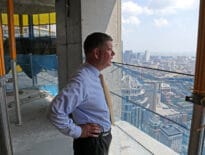As Boston Mayor Marty Walsh prepares to leave for Washington, D.C. after seven years at the helm of the state capital, he leaves a legacy his would-be successors should emulate when dealing with development.
First, and most importantly, Walsh prioritized housing construction throughout the city, setting a target of building 69,000 units by 2030. At last count, over 45,000 have been permitted, from the $34 million penthouse at One Dalton to many more affordable housing projects built by community development corporations across the city.
The mayor and his staff correctly recognized that Boston had to aggressively create more housing if it wanted to not only buffer its growing popularity among Millennials and empty-nesters alike, but also alleviate the city’s already too-high rents.
While his administration came in for criticism for being too friendly to luxury housing projects, the fact remains that these developments helped soak up demand that might otherwise have driven up city prices even further.
And those buildings helped generate much-needed funds for affordable housing. He backed the city’s adoption of the Community Preservation Act property tax, which has generated $92 million for housing, open space and historic preservation since 2016. He also increased the city’s “linkage” development fees, generating $80 million mostly for affordable housing from 2014 to 2020, and pushed through a final, substantial hike in his last weeks in office.
At a time when the developers of housing for the vast majority of working-class Bostonians need every cent they could get in the face of an unnecessarily convoluted financing system, these dollars were sorely needed. These accomplishments are praiseworthy, even if his administration flubbed a few notable opportunities like the Winthrop Square tower, whose revisions city development officials OK’d despite the changes costing a Chinatown affordable housing project its financing.
Critically, Walsh also enabled the construction of dozens of smaller-scale projects across the city by reforming the city’s development apparatus, setting clear rules and avoiding meddling in the approval process like so many predecessors infamously did.
His administration also embarked on a series of neighborhood planning exercises which, although regrettably not inked into city zoning, provided guidelines for developers that enabled them to pursue projects without worrying about costly landmines in a highly political approvals process.
Walsh leaves a strong legacy on which his permanent successor should build. With a housing crunch far from over and indications showing Boston will continue to be a popular business and investment destination post-pandemic, it will be important to ramp up planning efforts, as city councilor and mayoral contender Michelle Wu suggests, while keeping demands on development realistic. Most of all, though, the next permanent mayor of Boston must keep boosting housing construction across the income spectrum and look for ways to liberally deploy political and fiscal capital in its support.
Letters to the editor of 300 words or less may be submitted via email at editorial@thewarrengroup.com with the subject line “Letter to the Editor,” or mailed to the offices of The Warren Group. Submission is not a guarantee of publication.





